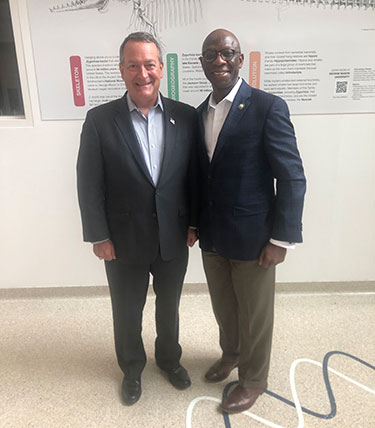
Retired Navy Vice Admiral Mat Winter (on left) with Mechanical Engineering Department Chair Oscar Barton at a special lecture for fourth-year mechanical engineering students. Photo by Leigh McCue.
Retired Navy Vice Admiral Mat Winter had 20 seconds. Twenty seconds to make a potentially life-altering decision while trying to land an A-6 Intruder aircraft safely with both engines on fire. In five seconds, Winter and the pilot made a decision. They communicated with one word so they both understood the next step – “continue.”
“The next 15 seconds were probably the most exciting of my life,” says Winter. Winter and the pilot continued to land, despite the manual’s advice, because they knew from experience that the outcome of raising their landing gear, putting the throttles at full power, and flying away could be catastrophic.
Communication and decision-making are just two of the important qualities that Winter, who has his bachelor’s degree in mechanical engineering from Notre Dame University, stressed to the students in the mechanical engineering Developing the Societal Engineer course.
Winter shared stories about how he found his way from leading 22 men to 125,000 in the Navy, and how being able to talk to people, make decisions and provide feedback were all key to his success.
“How you communicate, your body language, your facial expressions – never underestimate it,” says Winter.
In the Navy, in industry and even in school, having a decision-making model, values, a team-mentality, and being prepared are all key to success, says Winter. If you can make a space where people can find the best technical solutions, instead of giving a technical solution, then you can understand all of the risks, the issues involved, and what the solution needs to be, says Winter.
“There are very few things that are 100 percent you,” says Winter. “You step out in the real world you are going to be in teams. If you want people to work with you, and get that productivity out of yourself and others, it is ‘us’ and ‘we’ versus ‘I’ and ‘me.’”
Winter urged that even though they may not have everything figured out now, and they don’t need to, that keeping these goals and skills in mind will help students get to where they want to go in their career.
“But don’t eliminate any opportunity space,” says Winter. “About 60 percent of the orders I received were ones I didn’t want, but 100 percent were exciting and brought me to where I am.”
